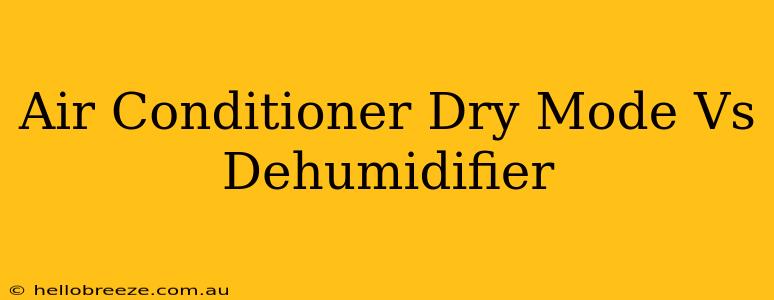Summer's heat and humidity can make your home feel sticky and uncomfortable. Many people turn to air conditioners for relief, but did you know that your AC unit might have a built-in dehumidifier? This begs the question: Is an air conditioner's dry mode as effective as a standalone dehumidifier? Let's delve into the differences and help you decide which is best for your needs.
Understanding the Differences: Air Conditioner Dry Mode vs. Dehumidifier
Both air conditioners and dehumidifiers aim to reduce humidity, but they achieve this in different ways. This understanding is key to choosing the right solution for your home.
Air Conditioner Dry Mode:
- How it works: Air conditioner dry mode cools the air slightly while removing moisture. The cool air condenses the moisture in the air, allowing the AC unit to collect and drain it away. This is a passive dehumidification process integrated into the AC’s cooling cycle.
- Pros: Convenient; already built into many air conditioners; helps manage both temperature and humidity.
- Cons: Less efficient at dehumidifying than a standalone dehumidifier; may not be powerful enough in extremely humid environments; increases energy consumption compared to just using the fan.
- Best for: Mildly humid climates or situations where you need to control both temperature and humidity simultaneously. Great for a light dehumidification while keeping cool.
Standalone Dehumidifier:
- How it works: A standalone dehumidifier actively extracts moisture from the air using a compressor and condenser, similar to a refrigerator. It doesn't necessarily cool the air, focusing solely on reducing humidity.
- Pros: More effective at dehumidifying than AC dry mode; ideal for high-humidity environments; often more energy efficient for dehumidification than running the AC in dry mode.
- Cons: Requires a separate purchase and space for the unit; only addresses humidity; can be noisy.
- Best for: High humidity areas; basements; rooms prone to mold and mildew; situations where you only need to reduce humidity.
Which Should You Choose?
The best choice depends on your specific needs and climate:
Choose an air conditioner's dry mode if:
- You live in a mildly humid climate.
- You need to cool and dehumidify your space simultaneously.
- You're on a budget and already have an air conditioner with a dry mode.
- You only need a relatively small amount of dehumidification.
Choose a standalone dehumidifier if:
- You live in a very humid climate.
- You have a problem with mold or mildew.
- You need to significantly reduce humidity without cooling the air.
- You only need dehumidification in certain areas of your home.
Maximizing Efficiency: Tips for Both Options
Regardless of your choice, maximizing efficiency is key:
- Proper ventilation: Ensure proper ventilation in your home to prevent moisture buildup.
- Regular maintenance: Clean or replace filters regularly to improve both air conditioners and dehumidifiers performance.
- Strategic placement: Place dehumidifiers strategically to optimize moisture removal and air conditioners in well-ventilated locations.
- Consider energy efficiency ratings: Look for energy-efficient models to reduce energy consumption and save money.
Conclusion: The Right Choice for a Comfortable Home
Ultimately, the choice between an air conditioner's dry mode and a standalone dehumidifier depends on your individual needs and priorities. By carefully considering the pros and cons of each option and following the tips provided, you can select the best solution to create a comfortable and healthy living environment. Now you're equipped to make an informed decision and conquer that summer humidity!

